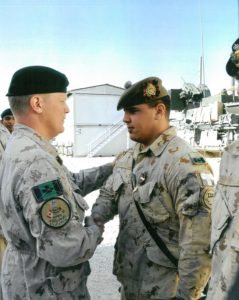Indigenous veteran reflects on time spent in the Canadian Forces

By Rick Garrick
RED ROCK INDIAN BAND — Red Rock Indian Band Chief Marcus Hardy, a veteran of the Canadian Forces mission to Afghanistan, usually lays a wreath for Indigenous veterans and those who served in Afghanistan on National Indigenous Peoples Day and Remembrance Day.
“On National Indigenous Peoples Day, we have a ceremony [in the community],” says Hardy, who served for 16 years with the Canadian Forces from 2000-2016. “And also on Remembrance Day, I usually go to Thunder Bay to Waverley Park [for the Remembrance Day ceremony].”
Hardy also speaks about his experiences in the Canadian Forces with children during classroom talks.
“I show them pictures of what I’ve done overseas and what it looks like — the landscape, the people, other kids over there,” Hardy says. “It gives an experience for them to see how other people live in other parts of the world.”
Hardy served in Afghanistan from Oct. 2009-May 2010 with 2nd Battalion Princess Patricia’s Canadian Light Infantry.
“We were on patrol almost every day,” Hardy says. “We were doing patrols out of Camp Nathan Smith, which is in downtown Kandahar City. A lot of people go to KAF, Kandahar Airfield, but we went there a few times during our tour just to get supplies. We were at an outpost, Camp Nathan Smith.”
Hardy joined the Canadian Forces Reserve in Thunder Bay when he was turning 17-years-old and then transferred to the Navy in 2004.
“I figured I would try my hand at [the Navy] just for a different experience,” Hardy says. “I was in the Navy for a few years and then I did some humanitarian aid — went to Hurricane Katrina. And then I went back to the Army.”
Hardy credits his service in the Canadian Forces for his leadership principles, work ethic, respect, empathy and service to people.
“I grew up in the Army,” Hardy says. “I think a lot of my qualities that I do have is from being in that environment.”
Hardy says his transition from being in the Canadian Forces to being a civilian was like “night and day.”
“In the military, you are told to do something and you do it in a fast and efficient manner to get the job done,” Hardy says, noting he finds civilian life does not move at a “high speed, high tempo pace” like his military life did. “The reason we did get stuff done in a fast and efficient manner was because maybe some lives were on the line or maybe this equipment was being used to go save some people or help people out. So everything we did, we did at a high speed.”
Hardy says he built some lifelong friendships while serving in the Canadian Forces.
“People that I was overseas with, I’d see them in Canada three years after we got back from Afghanistan and it was like we saw each other yesterday,” Hardy says. “A lot of times the only people that can relate to Army people are Army people. It’s good to talk to Army guys when you can.”
Hardy says he joined the Canadian Forces due to a sense of duty to serve his country and to follow in his family’s footsteps, noting that members of his family members served with the Canadian Forces during World War I and World War II.
“I come from a military background,” Hardy says. “I had great-uncles [serving] in World War II and great-grandfathers in World War I and II.”


